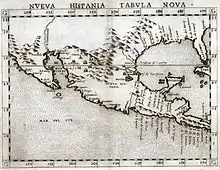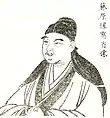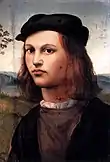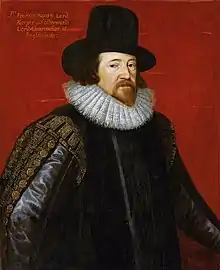1561
Year 1561 (MDLXI) was a common year starting on Wednesday (link will display the full calendar) of the Julian calendar.
| Millennium: | 2nd millennium |
|---|---|
| Centuries: | |
| Decades: | |
| Years: |
| 1561 by topic |
|---|
| Arts and science |
|
| Leaders |
|
| Birth and death categories |
| Births – Deaths |
| Establishments and disestablishments categories |
| Establishments – Disestablishments |
| Works category |
|
| Gregorian calendar | 1561 MDLXI |
| Ab urbe condita | 2314 |
| Armenian calendar | 1010 ԹՎ ՌԺ |
| Assyrian calendar | 6311 |
| Balinese saka calendar | 1482–1483 |
| Bengali calendar | 968 |
| Berber calendar | 2511 |
| English Regnal year | 3 Eliz. 1 – 4 Eliz. 1 |
| Buddhist calendar | 2105 |
| Burmese calendar | 923 |
| Byzantine calendar | 7069–7070 |
| Chinese calendar | 庚申年 (Metal Monkey) 4257 or 4197 — to — 辛酉年 (Metal Rooster) 4258 or 4198 |
| Coptic calendar | 1277–1278 |
| Discordian calendar | 2727 |
| Ethiopian calendar | 1553–1554 |
| Hebrew calendar | 5321–5322 |
| Hindu calendars | |
| - Vikram Samvat | 1617–1618 |
| - Shaka Samvat | 1482–1483 |
| - Kali Yuga | 4661–4662 |
| Holocene calendar | 11561 |
| Igbo calendar | 561–562 |
| Iranian calendar | 939–940 |
| Islamic calendar | 968–969 |
| Japanese calendar | Eiroku 4 (永禄4年) |
| Javanese calendar | 1480–1481 |
| Julian calendar | 1561 MDLXI |
| Korean calendar | 3894 |
| Minguo calendar | 351 before ROC 民前351年 |
| Nanakshahi calendar | 93 |
| Thai solar calendar | 2103–2104 |
| Tibetan calendar | 阳金猴年 (male Iron-Monkey) 1687 or 1306 or 534 — to — 阴金鸡年 (female Iron-Rooster) 1688 or 1307 or 535 |
Events

October 18: Fourth Battle of Kawanakajima.

Map of New Spain in 1561
January–June
- January 31 – The Edict of Orleans suspends the persecution of the Huguenots in France.
- March 1 – Kingston Grammar School is founded in England.
- April 14 – The citizens of Nuremberg see what appears to be an aerial battle, followed by the appearance of a large black triangular object and a large crash (with smoke) outside the city. A news notice (an early form of newspaper) is printed on April 14, describing the event.[1]
- May 8 – Madrid is declared the capital of Spain, by Philip II.[2]
- June 4
- The spire of Old St Paul's Cathedral in the City of London catches fire and crashes through the nave roof, probably as the result of a lightning strike. The spire is not rebuilt.[3]
- The nobility of Harrien-Wierland and the town of Reval (on June 6) of the Livonian Order swear allegiance to Sweden.
- June 25 – Francis Coxe, an English astrologer, is pilloried at Cheapside in London, and makes a public confession of his involvement in "sinistral and divelysh artes".[4]
- June 29 – Erik XIV is crowned King of Sweden.
July–December
- July – Arauco War: The hated encomendero Pedro de Avendaño and two other Spaniards are killed, triggering the Second Great Rebellion of the Mapuche.
- July 12 – Saint Basil's Cathedral in Moscow (started in 1534) is finished.
- August – English merchant Anthony Jenkinson arrives in Moscow on his second expedition to the Grand Duchy of Moscow.
- August 19 – Mary, Queen of Scots, is denied passage through England after returning from France. She arrives at Leith, Scotland on August 19.
- September 2 – The Entry of Mary, Queen of Scots into Edinburgh, a spectacular civic celebration for the Queen of Scotland, is marred by religious controversy.[5]
- September – Protestant reformer John Knox has a three-day debate in Maybole, Ayrshire, Scotland with Quintin Kennedy, commendator of Crossraguel Abbey, on transubstantiation. The result is inconclusive, but Kennedy is fighting a losing battle against the Reformation, which had been confirmed by the Scottish government in 1560.
- October 10 – Siege of Moji in Japan ends with the defenders retaining their position.
- October 18 – Fourth Battle of Kawanakajima: Takeda Shingen defeats Uesugi Kenshin, in the climax of their ongoing conflicts.
- November 28 – The Treaty of Vilnius is concluded during the Livonian War, between the Livonian Confederation and the Polish–Lithuanian Commonwealth. With the treaty, the non-Danish and non-Swedish part of Livonia, with the exception of the Free imperial city of Riga, subjects itself to Polish king and Grand Duke of Lithuania, Sigismund II Augustus with the Pacta subiectionis (Provisio ducalis). In turn, Sigismund grants protection from the Tsardom of Russia, and confirms the Livonian estates' traditional privileges, laid out in the Privilegium Sigismundi Augusti.
Date unknown
- Merchant Taylors' School is founded in the City of London by Sir Thomas White, Sir Richard Hilles, Emanuel Lucar, and Stephen Hales.[6]
- The first Calvinists settle in England, after fleeing Flanders.
- The Anglo-Genevan metrical psalter is published, including the Old 100th, the version of the hymn All People That on Earth Do Dwell made from Psalm 100, attributed to the probably-Scottish clergyman and biblical translator William Kethe, exiled in Geneva.[7]
- Ruy López de Segura develops modern techniques of chess playing in Spain.
- William Baldwin's Beware the Cat (written early 1553), an early example of extended fiction (specifically horror fiction) in English, is published anonymously in London. This edition appears to have been suppressed, and no copies survive.[8]
- Between 1561 and 1670, 3,229 alleged witches are executed in southwestern Germany, most by burning.
Births

Fujiwara Seika
- January 1 – Thomas Walsingham, English literary patron (d. 1630)
- January 6 – Thomas Fincke, Danish mathematician and physicist (d. 1656)
- January 22 – Sir Francis Bacon, English philosopher, scientist, and statesman (d. 1626)[9]
- January 24 – Camillo Cortellini, Italian composer (d. 1630)
- February 1 – Henry Briggs, British mathematician (d. 1630)
- February 8 – Fujiwara Seika, Japanese philosopher (d. 1619)
- February 15 – Johannetta of Sayn-Wittgenstein, German noblewoman (d. 1622)
- February 25 – Edward Talbot, 8th Earl of Shrewsbury, English politician and earl (d. 1617)
- March 9 – Archduke Wenceslaus of Austria, Archduke of Austria (d. 1578)
- March 29 – Santorio Santorio, Italian biologist (d. 1636)
- April 8
- June – Samuel Harsnett, Archbishop of York (d. 1631)
- June 7 – John VII, Count of Nassau-Siegen (d. 1623)
- June 12 – Anna of Württemberg, German princess (d. 1616)
- June 13 – Anna Maria of Anhalt, German noblewoman (d. 1605)
- June 20 (bapt.) – Richard Whitbourne, English colonist of Newfoundland (d. 1635)
- June 24 – Matthias Hafenreffer, German Lutheran theologian (d. 1619)
- June 26 – Erdmuthe of Brandenburg, Duchess of Pomerania-Stettin (d. 1623)
- July 2 – Christoph Grienberger, Austrian astronomer (d. 1636)
- July 11 – Luís de Góngora y Argote, Spanish poet (d. 1627)
- July 17 – Jacopo Corsi, Italian composer (d. 1602)
- July 24 – Maria of the Palatinate-Simmern, Duchess consort of Södermanland (1579-1589) (d. 1589)
- August 14 – Christopher Heydon, English politician (d. 1623)
- August 20 – Jacopo Peri, Italian composer (d. 1633)
- August 24
- August 25 – Philippe van Lansberge, Dutch astronomer (d. 1632)
- September 1 – Gervase Helwys, English murderer (d. 1615)
- September 3 – Yi Eokgi, Korean admiral (d. 1597)
- September 10 – Hernando Arias de Saavedra, Spanish colonial governor (d. 1634)
- September 21 – Edward Seymour, Viscount Beauchamp, son of Edward Seymour Sr. (d. 1612)
- September 28 – Roland Lytton, English politician (d. 1615)
- September 29 – Adriaan van Roomen, Belgian mathematician (d. 1615)
- October 11 (bapt.) – Thomas Lake, English Secretary of State to King James I (d. 1630)
- October 15 – Richard Field, English cathedral dean (d. 1616)
- October 24 – Anthony Babington, English criminal (d. 1586)
- October 27 – Mary Sidney, English writer, patroness and translator (d. 1621)[11]
- November 1 – Francesco Usper, Italian composer (d. 1641)
- November 16 – Andreas Angelus, German pastor, teacher, chronicler of the Mark of Brandenburg (d. 1598)
- December 1 – Sophie Hedwig of Brunswick-Wolfenbüttel, duchess consort of Pomerania-Wolgast (1577-1592) (d. 1631)
- December 7 – Kikkawa Hiroie, Japanese politician (d. 1625)
- December 9 – Edwin Sandys, English founder of the colony of Virginia (d. 1629)
- December 16 – Amandus Polanus, German theologian of early Reformed orthodoxy (d. 1610)
- date unknown – Stephen Bachiler, non-conformist minister and pioneer settler of New England (d. 1656)
Deaths

Ridolfo Ghirlandaio
- January 9 – Amago Haruhisa, Japanese samurai and warlord (b. 1514)
- January 13 – Frederick Magnus I, Count of Solms-Laubach, (b. 1521)
- January 31
- Menno Simons, Anabaptist religious leader and Mennonite founder (b. 1496)
- Bairam Khan, Turkoman noble and poet (assassinated)
- February 13 – Francis I, Duke of Nevers (b. 1516)
- February 26 – Jorge de Montemor, Spanish writer (b. 1520)
- March 6 – Gonçalo da Silveira, Portuguese Jesuit missionary (b. 1526)
- March 24 – Giulio d'Este, illegitimate son of Italian noble (b. 1478)
- March 25 – Conrad Lycosthenes, humanist and encyclopedist (b. 1518)
- March 28 – Bartholomeus V. Welser, German banker (b. 1484)
- April 9 – Jean Quintin, French priest, knight and writer (b. 1500)[12]
- May 4 – Karl I, Prince of Anhalt-Zerbst, German prince (b. 1534)
- May 16 – Jan Tarnowski, Polish noble (b. 1488)
- June 23 – Saitō Yoshitatsu, Japanese daimyō (b. 1527)
- June 6 – Ridolfo Ghirlandaio, Italian painter (b. 1483)
- July 9 – Sebald Heyden, German musicologist and theologian (b. 1499)
- July 19 – Henry Lauder, Lord St Germains, Lord Advocate of Scotland
- September 1 – Edward Waldegrave, English politician and recusant
- September 25 – Sehzade Bayezid, Ottoman Prince (b. 1525)
- October 27 – Lope de Aguirre, Basque rebel and conquistador (b. 1510)
- November 7 – Jeanne de Jussie, Swiss nun and writer (b. 1503)
- November 11 – Hans Tausen, Danish reformer (b. 1494)
- December 6 – Joachim I, Prince of Anhalt-Dessau, German prince (b. 1509)
- December 10 – Caspar Schwenckfeld, German theologian
- date unknown
- probable – Luis de Milán, Spanish composer (b. 1500)
References
- "Himmelserscheinung über Nürnberg" [Celestial phenomenon over Nuremberg]. NEBIS (in German). Zurich Library. April 14, 1561. (2 pages).
- Claudia Winn Sieber (1985). The Invention of a Capital: Philip II and the First Reform of Madrid. Johns Hopkins University. p. 59.
- Caroline Allen; Edward Earl of Wessex (1999). Edward Wessex's Crown and Country: A Personal Guide to Royal London. HarperCollins. p. 62. ISBN 978-0-00-414071-1.
- "BBC History Magazine vol 12 no 6 (June 2011), p13". Archived from the original on November 9, 2014. Retrieved November 9, 2014.
- A. R. MacDonald, 'The Triumph of Protestantism: the burgh council of Edinburgh and the entry of Mary Queen of Scots', Innes Review, 48:1 (Spring 1997), pp. 73-82.
- "Timeline Of Merchant Taylors' Company". The Merchant Taylors' Company. Archived from the original on June 10, 2007. Retrieved February 5, 2021.
- "All People That on Earth Do Dwell". The Cyber Hymnal. Archived from the original on July 3, 2011. Retrieved June 5, 2012.
- Ringler, William A.; Flachmann, Michael, eds. (1988). "Preface". Beware the Cat. San Marino, CA: Huntington Library.
- "Francis Bacon | Biography, Philosophy, & Facts". Encyclopedia Britannica. Retrieved March 31, 2019.
- "Thomas Howard, 1st earl of Suffolk | English commander | Britannica". www.britannica.com. Retrieved May 31, 2022.
- Mary Sidney Pembroke (comtesse de).); Mary Sidney Herbert Countess of Pembroke; Mary Sidney Herbert (1998). The Collected Works of Mary Sidney Herbert, Countess of Pembroke: Poems, translations, and correspondence. Clarendon Press. p. 3. ISBN 978-0-19-811280-8.
- Vella, Horatio C. R. (2003). "Jean Quintin's Insulae Melitae Descriptio (1536) : an anniversary and a discussion on its sources" (PDF). Humanitas: Journal of the Faculty of Arts. University of Malta. 2: 155–171. Archived from the original (PDF) on September 19, 2020.
This article is issued from Wikipedia. The text is licensed under Creative Commons - Attribution - Sharealike. Additional terms may apply for the media files.

